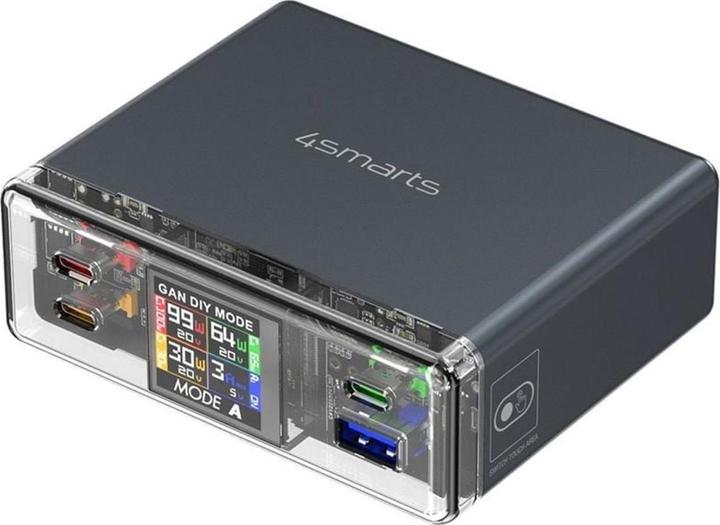

4smarts charger with 210 watts: the prettiest power station for your office desk
Chargers are boring? Nope, not according to manufacturer 4smarts. They transform the 210-watt Lucid GaN DIY Mode Charger into an eye-catcher suitable for office desks.
A pleasant surprise right to start off my test. When I unbox the 4smarts charger, I notice it’s much more compact than I expected. The pictures and packaging were deceptive. Its casing is just ten centimetres long, four centimetres high and eight and a half centimetres wide.
However, at 450 grams, the Lucid GaN DIY Mode charger is a bit heavier than expected. This isn’t so bad, the charger isn’t intended for use on the move, but as a stationary charging station – on an office desk, for example.

Source: Lorenz Keller
How it looks, inside and out
The 4smarts model is particularly striking because of its housing. Five sides are made of metal, but the front is plexiglass. I can’t actually see inside from here, only the circuit board with four USB ports is visible – but it still looks very stylish. It’s also reminiscent of Sharge power banks or Nothing smartphones, they all share a similar look.
The TFT display in the middle of the front side is also striking. It displays how many watts a connected device is currently drawing. The voltage supported is also visible. With smartphones, for example, this is often 5 volts, and 20 volts for a MacBook.

Source: Lorenz Keller
Lots of power – but not unlimited
The Lucid GaN DIY Mode Charger supports 210 watts – more than many other models. Of over 3,000 chargers in our range, only around 20 models offer more than 200 watts.
The model is relatively compact as 4smarts uses the expensive semiconductor material gallium nitride – hence the term GaN, which can also be found in many other high-quality chargers. This crystalline material is used as an alternative to silicon since it’s an excellent conductor while remaining very robust. It allows manufacturers to build smaller chargers that get less warm, leading to greater performance.
Three USB-C ports and one for USB-A are available for charging gadgets. Unlike other models, the available total 210 watts isn’t automatically divided between these slots. I select one of the three settings via a control area on the side.

Source: Lorenz Keller
In A mode, the first USB-C port delivers a maximum of 100 watts, the second 65 watts and the third 30 watts. In B mode, two connections each offer 100 watts, while the third USB-C is off. Mode C delivers 75 watts twice and 45 watts once. Finally, the USB-A socket offers 15 watts.
The drawback here: I have to remember to switch modes as required. Still, I love that I can consciously control where current flows. For example, it can charge two laptops quickly.
Incidentally, limits like these are present in all chargers. On some they’re fixed, on others they vary depending on the number of connected devices. This quickly has me memorising complicated schemes as to which port does what and when.

Source: Lorenz Keller
Hot charger, scorching price?
If I charge my MacBook and a smartphone at the same time, the charger gets warm but not hot. I measure a maximum of 45 degrees, very acceptable. The manufacturer also promises temperature monitoring to ensure trouble-free charging – as well as a long product life.
And what about the price? Around 150 francs or euros for a charger with a capacity of 210 watts is certainly no bargain. You can get Digitec’s own 240-watt charger for 30 francs less. However, it’s a black block with ports only – no display, no good looks.
The Ugreen Nexode Desktop offers even more power. For just over 200 francs, you get 300 watts and a total of five USB ports. In terms of design, however, this is also a charger that doesn’t want the limelight.
If you want to spend significantly less money, you should look in the 150 to 200 watt range. A budget of 80 to 100 francs is enough for that.

Source: Lorenz Keller
In a nutshell
Focus on design and power
The Lucid GaN DIY Mode Charger belongs in the upper range of chargers with its 210 watts of power. With its special design, the 4smarts model stands out from the competition. No charger looks as chic on an office desk.
But this eye-catcher is also technically impressive. It allows me to choose which ports deliver how much power. And thanks to its display, I don’t have to memorise the many settings. A definite plus – if you actively use it.
Pro
- stylish and compact design
- plenty of power
- variably adjustable
- display containing all information
Contra
- changing settings can be forgotten
- not exactly cheap
Gadgets are my passion - whether you need them for the home office, for the household, for sport and pleasure or for the smart home. Or, of course, for the big hobby next to the family, namely fishing.




